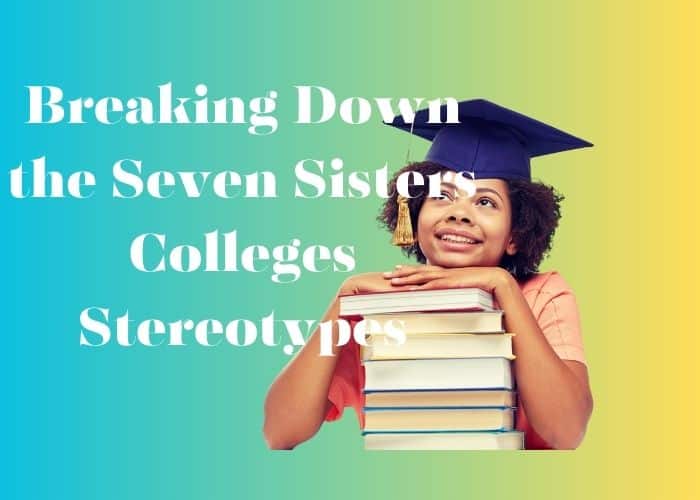
The Seven Sisters Colleges Stereotypes: Women’s colleges have been a critical part of higher education in America since the early 19th century. The Seven Sisters Colleges, established before women were admitted to Ivy League universities, are some of the oldest and most prestigious educational institutions for women in the United States.
However, with stereotypes still embedded in our culture about gender bias and female empowerment, these historic colleges face their share of criticism. This article will explore some common misconceptions and stereotypes surrounding the Seven Sisters Colleges.
The Seven Sisters Colleges Stereotypes We’ve All Been Feed with
1. Feminism Is Dead at Women’s Colleges
There is a prevailing belief that feminism has no place on campuses that only admit female students. This stereotype perpetuates today because many people believe that advocating for feminist ideals is not warranted when there is no male presence around.
But although women attend these colleges without men as classmates or professors—students—or faculty—they can still encounter sexism and misogyny from outside their bubble communities, like when they enter male-dominated workplaces after graduation.
Being around bright young ambitious-minded female friends does not make individuals any less significant on campus than those interacting with both genders during college life.
Being empowered by intersectional perspectives can enhance academic achievements provoking empathy development seen as invaluable beyond single-gender classrooms experiencing diverse social variables prevalent regardless inside or outside school premises challenges future issues faced by society related to sex crises within professional industries globally.
2. All Students Are Ultra-Competitive
The idea that all women’s colleges attract ultra-competitive types rather than inclusive individuals striving towards shared academic goals isn’t entirely accurate either! These schools teach collaborative spirit alongside developing student autonomy so younger generations may later expand practical skill sets, enhancing global network capacities while trying to bring changes worldwide!
Evidence suggests that nurturing down-to-earth learning hubs founded upon close mentorship relationships between faculties and professors, like most Seven Sister colleges, accomplish more positive learning experiences for all students.
This results from community-building educational tradition, which focuses on providing opportunities regardless of socioeconomic background, fostering equal chances, and outshining lackluster perceptions about Seven Sister Colleges’ elitist or exclusive vibes.
Furthermore, since these schools embrace diverse interests and passions apart from academics enhancing personal growth and reflecting many fun activities engaging with peers alongside developing leadership skills enables individuals to enjoy working towards their goals personally while finding team members who share the same aspirations too!
Check Also; Top SEC Schools with Rolling Admissions
3. Only Certain Majors Are Offered
The stereotype that women’s colleges offer only certain majors limits learners’ academic development isn’t always true!
These restrictions facing liberal arts programs are fading rapidly due to increased outreach emphasizing holistic education, eradicating gender bias while shaping vocational strengths.
These colleges grant wider support targeting future careers, post-collegiate life, optimizing job search success positively backed by school alumnae networks, and paving globally empowering skill sets needed for navigating respective industries post-graduation and fulfilling challenging opportunities.
For instance, students attending Bryn Mawr College can opt for courses like investing in innovation and life-changing events of the pandemic health disparity. Emphasize the interdisciplinary nature of having curious minds surrounded within integrated university systems, making them flourish in developing themselves into exceptional young leaders tackling pressing societal issues.
The Seven Sisters Colleges
The Seven Sisters Colleges comprise a historic consortium of liberal arts institutions in the northeastern United States. Originating as women’s colleges, they were founded in the 19th and early 20th centuries.
This consortium includes:
- Barnard College
- Bryn Mawr College
- Mount Holyoke College
- Smith College
- Vassar College
- Wellesley College
- Radcliffe College (now integrated into Harvard University)
Initially established to provide women with access to higher education during a time when most universities were exclusively for men, these colleges have played a pivotal role in advancing women’s education.
Over time, they transitioned into coeducational institutions while continuing to prioritize academic excellence and fostering the empowerment of women across various disciplines.
FAQ on Seven Sisters Colleges Stereotypes
1. What makes Women’s colleges so different from Co-ed universities?
Women-only spaces help develop a sense of belongingness amongst female professionals studying there, resulting in immense progress invaluable not just within diverse-society well-being but also career-enhancing perspectives, broadening exposure, and collaborative teamwork. Also, creating successful trailblazing thought-leaders progressing various fields historically dominated primarily by men.
2. Do mission statements vary across seven Sister Colleges?
Seven sisters have unique distinguished characteristics addressing societal needs through rigorous training using creative cognitive approaches imparting necessary knowledge demanding further improvements during the academic journey shaping holistic development due to intersectional approaches preparing learners for future challenges.
Conclusion on Seven Sisters Colleges Stereotypes
In conclusion, stereotypes must not overshadow our perception of Seven Sisters Colleges’ quality education as they have historically impacted society and nurtured successful women leaders.
These colleges celebrate diversity and inclusiveness, fostering a spirit of collaborative growth aimed towards changing attitudes emphasizing equal opportunity and gender equity, reducing sexism wherever encountered, empowering new leaders, and paving the way for big changes tomorrow!
Stereotypes can be damaging; however, let us challenge them and discover the truth behind their flawed theories or claims so students feel proud growing self-achieved with newfound confidence received from prestigious Women-Led Institutions.
By helping shatter traditional social norms around the campus community irrespective of individual backgrounds.
Leave a Reply